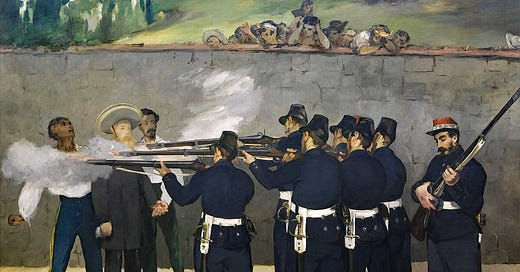The Grand Tragedy of the Last Emperor of Mexico
The dramatic life and noble end of Maximilian I is one of the great tragic epics of the 19th century — and a cautionary tale of innocence and power...
When the sun rose over the mountains of Mexico’s Sierra Gorda on the 19th June 1867, it did so with cruelly deceptive beauty.
It was shortly after six o’clock in the morning that the prisoner emerged into the blinding rays which had engulfed the city of Querétaro. With the almost playful peace that defines those men who have embraced their imminent doom, he exclaimed:
“Ah! what a splendid day! It was always my wish to die upon such a one, and my prayer has been answered.”
Such indeed was the valour of this man that many who had attended him out of sympathy now found themselves consoled by the object of their grief. “Be calm, my friends”, he reassured those who wept, as they clasped his hands. “It is the will of God that I should die, it is not for us to deny it”.
Now led to the rise of the Cerro de las Campanas, along with his two loyal generals Miramon and Méjìa, the Emperor of Mexico Ferdinand Maximilian of Habsburg assumed his position — not in a palace, but before a ramshackle brick wall. His companions were blindfolded, but the Emperor politely declined, instead offering a gold coin to each of his executioners. “Aim here, and aim well” he requested, gesturing to his heart.
With beads of sweat upon his brow from the blazing central American sun, he turned now to the gathered, and delivered his parting words:
“Mexicans!
Persons of my rank and origin are destined by God either to be benefactors of the people or martyrs. Called by a great part of you, I came for the good of the country. Ambition did not bring me here: I came with the best of intentions and sincerest wishes for the future of my adopted country and for that of my soldiers, whom I thank before my death for the sacrifices which they have made for me.
Mexicans! May my blood be the last which shall be spilled for the welfare of the country; and if it should be necessary that its sons should still shed theirs, may it flow for its good, never by treason.
Long live Independence; long live Mexico!”
With such words, and a smile, he lowered his hands, and with a discharge of firearms that would echo across Mexico and the world, five bullets pierced his body. At thirty four years of age, the tragedy of Maximilian of Habsburg was complete.
While the plot of this equal-parts grand geopolitical drama and intimate personal tragedy are practically unknown to most people today, it constitutes an episode that radically altered the course of world history. Indeed, Maximilian’s death not only spelled the end of Napoléon III’s ambitions in Mexico, but paved the way for the beginning of U.S. hegemony in the Americas.
Today, we recount a cautionary tale of innocence and power — the story of a good man exploited by the deception of others, only to be torn down by their betrayal. It was a tragedy which had begun just a few years earlier, yet a great many miles away…
Keep reading with a 7-day free trial
Subscribe to INVICTUS to keep reading this post and get 7 days of free access to the full post archives.




